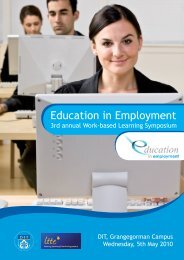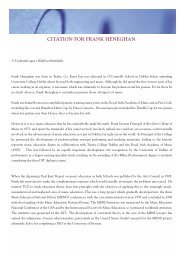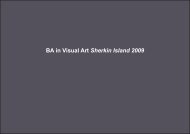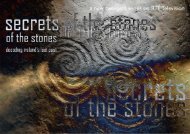TWICE THE SIZE - DIT Update - Dublin Institute of Technology
TWICE THE SIZE - DIT Update - Dublin Institute of Technology
TWICE THE SIZE - DIT Update - Dublin Institute of Technology
You also want an ePaper? Increase the reach of your titles
YUMPU automatically turns print PDFs into web optimized ePapers that Google loves.
in the knowledge economy and as a “city <strong>of</strong> learning”, mirroring the sentiments <strong>of</strong> the Cork<br />
2002-2012 - Imagine our Future publication. The message is straightforward: those with a high<br />
level <strong>of</strong> learning are likely to have a bright future ahead <strong>of</strong> them, while those lacking will have a<br />
very difficult time. At secondary and primary level, educational priorities have been front-<br />
loaded and “e-learning through edutainment” promoted as the future <strong>of</strong> childhood learning.<br />
Significant investment in school building and technology, and teacher training, has occurred in<br />
an attempt to reverse the trend <strong>of</strong> home schooling that emerged in the late 2010s. Free pre-<br />
school education was introduced in 2012 and community-based childcare providers are the<br />
norm, particularly to help the children <strong>of</strong> foreign nationals who are heavily represented in<br />
Cork’s young demographic.<br />
Energy<br />
Energy concerns dominated the environmental agenda in Cork, and indeed nationally,<br />
throughout the 2010s and the early 2020s. Securing a cheap, clean and renewable energy supply<br />
was deemed essential to the future competitiveness <strong>of</strong> all Irish cities. Following the oil crisis in<br />
2012, Cork was proactive in capitalizing upon the need for applied research and development<br />
into energy technologies. Wind farms, as well as wave and tidal energy projects in West Cork,<br />
were well placed during the crisis years to benefit, rather than suffer, from rising oil and gas<br />
prices, and strategic policy reforms were introduced in 2013 to remove obstacles from the Irish<br />
energy market for the proliferation <strong>of</strong> renewable energy sources. Cork has since turned into a<br />
centre <strong>of</strong> excellence in wave energy, with the location <strong>of</strong> the headquarters <strong>of</strong> the Irish owned<br />
Finavera Renewables to West Cork in 2015 signaling the marked level <strong>of</strong> progress made in this<br />
respect.<br />
Governance<br />
Although the city picture <strong>of</strong> Cork has, in general, changed for the better, the need has arisen for<br />
it to re-think, re-learn, re-direct and re-mange itself. The processes <strong>of</strong> social change calls for a<br />
consideration <strong>of</strong> the values and ideologies governing everyday affairs and, therefore, new<br />
frames <strong>of</strong> reference are necessary to understand what this might mean for the future in the<br />
2030s and beyond. The undertow <strong>of</strong> discontentment and disillusionment with political decisionmaking<br />
throughout the early years <strong>of</strong> the 21 st century highlighted the need for a pragmatic<br />
response to address the potentially colossal social pressures emerging within Cork. The hunt for<br />
an appropriate model to adopt continues. Perhaps the non-plan angle is one to consider,<br />
requiring a willingness to take risks. In any case, what is evidently required in this scenario is<br />
leadership at the city level; otherwise, Cork will soon pay the price. The “Nero” scenario signals<br />
a time <strong>of</strong> social change.<br />
158








